#reatas
Note
In Mexico, Riata is a vulgar slang for penis too 😅
And yet there is none in the fic! Ugh, thanks for pointing out the missed opportunity, anon! 😜
I’ll argue that Coop is a bit of a prick though… the name stays.
#I am going to say riata so aggressively now#RIATA#but also lariat#lasso#reata#rope#loop#tether#snare#lol riata is slang for cock#I live in the south and this is endlessly funny to me
1 note
·
View note
Text
Resta dove ti senti bene.
Il segreto è questo: mai tanto per stare, mai tanto per fare, mai tanto per avere, mai tanto per dire.
• Gabriela Pannia
@tqngled
#tqngled#reata#dove#ti#senti#bene#il#segreto#è#questo#mai#tanto#per#stare#fare#avere#dire#frasi#citazioni#gabriela pannia
0 notes
Text
Rocky
This is a rather nice pinot–WELL worth the 10 bucks I spent on it. Those in the back rows will need no introduction to Pedrigal Vineyard–and no, NOT the one in Oakville–in the postage-stamp AVA of Paicines in the original SBC: San Benito County. This is the first time I’ve seen something sourced from there outside a few close families with popular last names in the whole MontCo/SLH community.…

View On WordPress
#Best wine reviews#Central Coast Critic#Central Coast Wines#Paicines AVA#Pedrigal#Pedrigal vineyard#Pinot Noir#Reata wines#San Benito County#soif#Soif Wine Blog#Stephen McConnell#Stephen McConnell Wine Blog#Steve McConnell#Steve McConnell Wine Blog#wine1percent
1 note
·
View note
Photo

Reata vanidosa… #reflejos #espejitoespejito #reata #cdmx (en Mexico City, Mexico) https://www.instagram.com/p/CpLX8lOOErG/?igshid=NGJjMDIxMWI=
0 notes
Note
So cowboys were actually mostly poc, queer people and gnc people. This is because cow herding was not an easy job, so people who were ostracized in society found it easier to get work their, for a less nuanced version of it (because I'm on 8%). There was a particularly memorable story for me about a ftm trans midwife, who would ask women "are you comf?" And was generally very kind and understanding. After his death, it was found out that he was trans, and a lot of his memory was tarnished. His closet friend, a woman said afterwards about him "Poor dear. I hope he's comf." And it makes me want to cry.
Oh vaqueros! My family are vaqueros! They were called vaqueros, which can be very loosely translated into cow herder/man, which is how we got the English word for cowboy! You're correct in that vaqueros were primarily poc and/or queer, but the notion that they were made up of ostracized people is more for the American cowboys, as vaqueros in Mexican and Native cultures were highly respected by their people! Usually, vaqueros were norteños (Northern Mexican men), Mexican indigenous, American indigenous, black, or mixed men! They were hired to cattle ranchers often to herd cattle, and known for reata, which is the art of lassoing to catch animals (I'm not sure how to explain better in English sorry).
There were many competitions for vaqueros to show off their lasso skills, my stepdad actually participates in local shows/competitions! He's won a few too it's super cool! In the modern area, cowboys as we know them from the American side are usually wealthier ranchers. They tend to own a lot of land and animals, and are usually cornerstones of their communities For Mexican and Indigenous vaqueros, in my experience, they're usually the common person and not exclusive to wealthier families. Many families grow up with bringing their kids into the lifestyle, and are usually small business owners. They get hired on to do the 'dirtier' work of caring for the horses' and cattle wellbeing, such as trimming and shoeing their hooves, branding, and training younger foals.
For the ones that were ostracized from society, though, you're correct that it was sometimes a sad life for them. It was often the only way of living for queer people in the southwest, as they were limited in what they could do to live sustainably. Unfortunately, cowboys and vaqueros were looked down on my Americans taking over the west, and it wasn't uncommon for even the most kind cowboys' names to be tarnished. Because the American school system is very limited (being nice about it) in what they teach, and have looked down on cowboys and vaqueros because they were poc and/or queer, even though they were greatly respected by their own communities.
The irony is that American cowboys are seen as one of the highest examples of masculinity at the same time. It's disappointing, because there's so much history and culture within old vaqueros that is incredibly interesting! I'm particularly disappointed with the lack of information on queer vaqueros, but I know there's more research going on about them at the moment! Hopefully we'll have more history revealed soon!
27 notes
·
View notes
Text

Con esta foto me despido por hoy
Me voy a mimir
Descansen besOs en sus reatas 🫶🤝
19 notes
·
View notes
Text

TASK IV — She's the death you chose, you're in terrible danger
Básico
Nome: Jocelyn Jenkins
Idade: 35 anos
Altura: 1,75
Porte: Esguio.
Pontos para serem utilizados: 175 pontos
Atributos (-95)
Saúde: - 15
Força: - 10
Ataque: - 12
Defesa: - 12
Mobilidade: - 10
Inteligência: - 12
Estabilidade Emocional: - 7
Perícia: - 17
Perícia/Habilidades (-45)
Lábia (Mental/Média) - 10 pontos
Programação de Computadores/NT (Mental/Difícil) - 15 pontos
Laço e Nós (Reata) (Física/Média) - 10 pontos
Acrobacia (Física/Difícil) - 15 pontos
Vantagens (- 35)
Armas de Fogo (pistolas) (Física/Fácil) - 5 pontos
Carisma – aptidão natural para impressionar e liderar outras pessoas. - 10 pontos
Intuição - O personagem tem grandes chances de acertar em suas conjecturas em investigações. - 15 pontos
Destemor – não é fácil assustar ou intimidar este personagem. - 5 pontos
Ultraflexibilidade nas juntas - 5 pontos
Desvantagens (+45)
Mentir Compulsivamente - As mentiras que o personagem conta pode colocar todos em risco +15 pontos.
Insensível – capaz de entender emoções alheias, mas apenas com o objetivo de manipulá-las, pois não se importa nem um pouco com os sentimentos e sofrimento alheio. +10 pontos
No limite – assume riscos extremamente irracionais diante do perigo mortal. A maioria das pessoas testemunhe tais comportamentos acredita que trata-se de um maluco. + 10 pontos
Compulsões – hábito ou vício que toma boa parte de seu tempo e dinheiro. Exemplos: doces, boemia (festas, farras e bebedeiras), gastar compulsivamente, jogatina compulsiva, mentir compulsivamente, etc. +10 pontos
2 notes
·
View notes
Text

(GO TO PART 1 AND PART 3)
PART 2
60. In chapter 23, it’s finally revealed that Javier now works for a charity on the Texas-Mexico border. This idea has been in my head for over a year, as can be seen from the below notes I made to myself in February/March 2023:
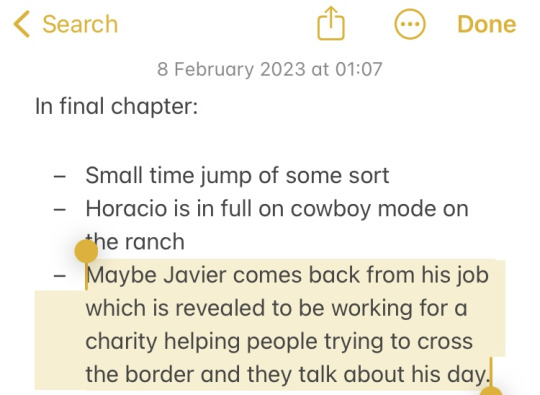
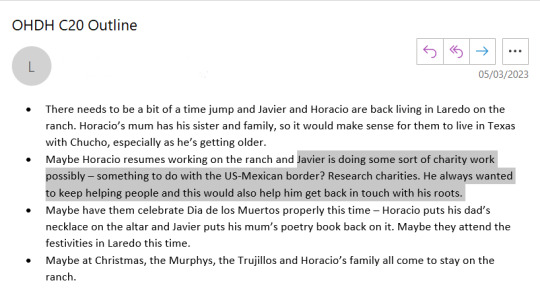
Strangely, I then read Infinite Country by Patricia Engel (referred to above at point 50) in early May 2023, which contains the following passage:

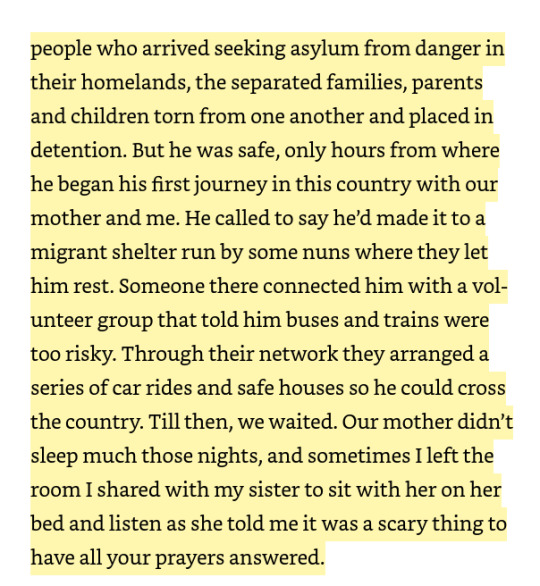
So, that made me even more determined to go down this path with Javier ❤️
I won’t list all of the different charities/not-for-profits/NGOs I researched, but there are some mentioned here plus Border Angels and Al Otro Lado. Not all of them are Texas-based, but they do operate somewhere along or near the US-Mexican border, so I used a mix of them as inspiration.
61. Horacio’s route to getting a visa and green card in chapter 23 was largely based on the real-world EB5 visa. Although, I may have taken slight liberties for the purposes of the story (it was hard to see any other real life route for Horacio to actually be granted a long term visa/green card to be honest…which is apt for other themes of this chapter), so it’s not 100% accurate to real life lol.
62. There are several references in chapter 23 to America’s sodomy laws that were still in place in some states, including Texas, by 1997 (when chapter 23 is set), but it wasn’t until the landmark Supreme Court case of Lawrence vs Texas in 2003 that it was ruled sodomy laws in Texas and various other states were unconstitutional.
For further reading on the queer rights movement (and the violence and harassment queer Texans faced) that paved the way for Lawrence vs Texas, I highly recommend Before Lawrence v. Texas: The Making of a Queer Social Movement by Wesley G Phelps
63. If you wondered what a lariat was in chapter 23, it’s the rope cowboys use to lasso (‘lasso’ is actually the verb, whereas the rope itself is called a ‘lariat’, which comes from the Spanish word la reata, meaning to catch or fasten).
There’s also a reference to a quirt, which is a short leather whip used by cowboys to encourage their horse to go faster.
64. As for the sex scene in chapter 23…eagle-eyed readers may have spotted the foreshadowing for this in chapter 20 😉 A long while before I even wrote chapter 20, I’d had Horacio wearing a harness in my head (these are things that live in my brain rent free, apparently lol), largely influenced by this Tumblr post mixed with this one and this one and the gay leather movement. Speaking of which…the references to Drummer relate to a real gay leather magazine that exists in the US.
I made up the part about the harness instructions and a cowboy/rodeo special, however, there is a website with scans of old issues…and lo and behold, there was a cowboy special (WARNING FOR HIGHLY NSFT/W CONTENT).
There’s also a fascinating interview here with ‘Cowboy Frank’ who created the above archive of gay magazines as a tribute to his late husband.
65. Keeping on the theme of gay cowboys…gay rodeo is a real thing in Texas. You can read more about it here, here, here, here and there are some photographs here too.
I also have Slapping Leather: Queer Cowfolx at the Gay Rodeo by Elyssa Ford and Rebecca Scofield and Rodeo as Refuge, Rodeo as Rebellion: Gender, Race, and Identity in the American Rodeo by Elyssa Ford to read at some point (unfortunately, I didn’t get chance to read them before posting chapter 23), which look really interesting.
I couldn’t in a million years see Horacio (or Javier for that matter) taking part lol, but I wanted to at least mention its existence in chapter 23.
66. I’ve mentioned Día de Muertos above already, but here’s more about what the different items on an ofrenda represent and also a breakdown of what happens on each day of the festival.
67. La Virgen de Guadalupe, La Llorona and La Malinche are all referenced in chapter 23.
I initially got the inspiration to include the Guadalupe prayer card from these promo images of Javier. But it wasn't until I started doing more research, I discovered her links to La Llorona and La Malinche. Their identities throughout Mexican history change depending on who is telling the story (which is why Chucho lists various different names) and La Virgen de Guadalupe in particular symbolises the shift Mexico underwent after the Spanish colonisers arrived (from the religion of the Aztecs to Catholicism).
This is a strong theme in Borderlands/La Frontera: The New Mestiza by Gloria Anzaldúa and this book was a big inspiration for the conversation between Javier and Chucho about their Mexican roots.
I also found an interesting article dissecting the trio as different archetypes of women (in fact, it quotes Gloria Anzaldúa as well).
Some other related pieces about La Virgen de Guadalupe and how she relates to Mexican/Chicano identity:
Tonantzin Tlalli Coatlicue & Our Lady of Guadalupe
Commentary: The representations of La Virgen de Guadalupe show her power over identity
Celebrating Guadalupe, Sacred Icon of the People
I may have gone a bit overboard with this part of my research lol, but it was so fascinating to me, I just kept falling down different rabbit holes. And I’ve always liked the idea of Javier being caught between two worlds – in the show, and in the OHDH universe. So, this all served chapter 23 well with Javier returning to Laredo and trying to connect the different parts of his identity.
68. Operation Gatekeeper and Operation Hold the Line are referenced in chapter 23. These were two anti-immigration initiatives in the early ‘90s which involved the militarisation of the US-Mexican border with an increase in Border Patrol staff, the introduction of checkpoints and the building of physical walls.
69. Javier references new immigration legislation in chapter 23. ‘IIRIRA’ is the Illegal Immigration Reform and Immigrant Responsibility Act 1996, which came into effect on 1st April 1997.
It was yet more harsh anti-immigration measures that widened the remit for people to be removed, deported and banned from the US. Here’s an article about the problems the legislation caused.
Ironically, whilst America was doing everything it could to keep people from crossing the border, the passing of NAFTA in 1994 actually made drug trafficking across the border easier and exacerbated cartel-related violence in Mexico.
Whilst on the subject of US immigration, there is also a reference to the ‘INS’ in chapter 23, which was the predecessor to ‘ICE’ (ICE was formed in 2003, so it would still have been INS in 1997).
70. Towards the end of chapter 23, when Javier and Horacio are snuggled under a mesquite tree and talk about a story they read in The New Yorker, it was, of course, Brokeback Mountain by Annie Proulx, which was first published in TNY as a short story on 6th October 1997.
I had to fit a reference to it in this fic somewhere lol. Although, for as much as that story influenced OHDH in places, I like to think Javier’s and Horacio’s ending is the antithesis to the ending of Brokeback Mountain ❤️
71. At the end of chapter 23, various artists are mentioned as appearing on their bookshelves. I’ve picked out either titles of significance or reasons for why they’re referenced:
Our Lady of the Assassins (La Virgen de los sicarios) by Fernando Vallejo (A gay Medellín-born author writing semi-autobiographically about a gay man living in Medellín during the worst years of violence…I don’t think I need to explain further why this is on the list lol)
Maurice by E.M. Forster and also the film adaptation (A gay romance with a relatively happy ending for a change)
City of Night by John Rechy (Follows a gay Texan man’s journey and sexual encounters across America)
Gloria E. Anzaldúa (See point 67 above)
Alejo Durán (Colombian Vallenato musician – and cowboy)
Long, Long Time by Linda Ronstadt (If you’ve seen The Last of Us, you’ll know why I chose this. If you haven’t seen it, please make a point of watching season 1, episode 3 as it’s one of the most beautiful queer love stories I’ve ever witnessed 😭)
Drag by K.D. Lang (A covers album by a lesbian musician of songs centred around smoking…again, I don’t think I need to explain any further lol)
Para Siempre by Vicente Fernández (A Mexican ranchera singer…just look at the lyrics for Para Siempre and sigh longingly)
Preface to Leaves of Grass by Walt Whitman (Specifically for this quote, because I stumbled across it by accident and it fit so many themes of the fic:
“Past and present and future are not disjoined but joined. The greatest poet forms the consistence of what is to be from what has been and is. He drags the dead out of their coffins and stands them again on their feet….he says to the past, Rise and walk before me that I may realize you. He learns the lesson….he places himself where the future becomes present.”)
Pedro Almodóvar (A Spanish gay film director I’ve mentioned above somewhere before…and also coincidentally worked with Pedro Pascal in Strange Way of Life)
The Living End written and directed by Gregg Araki (Just a couple of gay HIV Positive guys on a road trip)
72. The end scene of them dancing together was largely inspired by two things:
This gorgeous, gorgeous piece of artwork (artist at the link).
And this scene in Fellow Travelers.
I had originally intended to end chapter 23 like the artwork, but after watching Fellow Travelers in December 2023, I had to write my own nod to possibly one of the most intimate scenes I’ve ever seen committed to camera. I swear it re-wired my brain chemistry.
And it’s funny, because I hadn’t actually read or even heard of Fellow Travelers by Thomas Mallon when starting OHDH, but there are so many delightful parallels (e.g. Tim and his cross necklace/religious guilt and the Dom/sub undertones, all of their dancing, the switching in power dynamics during sex as a way to show vulnerability…I just couldn’t help but imagine Horacio/Javier in all the Hawk/Tim sex scenes).
73. A few other books/articles I read for chapter 23 research that I haven’t mentioned already:
Farm Boys: Lives of Gay Men from the Rural Midwest by Will Fellows
The Distance Between Us by Reyna Grande
Retablos: Stories From a Life Lived Along the Border by Octavio Solis
Where We Come From by Oscar Cásares
Brownsville: Stories by Oscar Cásares
Beyond Smoke and Mirrors: Mexican Immigration in an Era of Economic Integration by Douglas S. Massey, Jorge Durand and Nolan J. Malone
In the Valley of Mirrors by Antonio Ruiz-Camacho
Out West, the Gay Cowboy Roams Free by Evan Moffitt (New York Times article transcribed on my Tumblr)
2 notes
·
View notes
Text
¡El “gusto” de mi primera salida pospandemia!
¡Que hay de nuevo Skylets!
Hoy les traigo lo que escribí hace unos meses para un concurso gastronómico de la revista "Asomarte".
Esta travesía tomó lugar después de unos largos 18 meses en los que pensé que perdería la cabeza por el encierro, la preocupación y la desesperación que me generó tan horrible época que nos tocó vivir: la pandemia por COVID-19. Considerando estas condiciones era evidente que mis expectativas y emoción se encontraban por los cielos por mi primera salida pospandemia, así fue como mi salón y yo nos adentramos al suroeste del estado de Querétaro, en una comunidad otomí llamada Villa Progreso, localidad del municipio de Ezequiel Montes, a una hora aproximadamente de la capital.
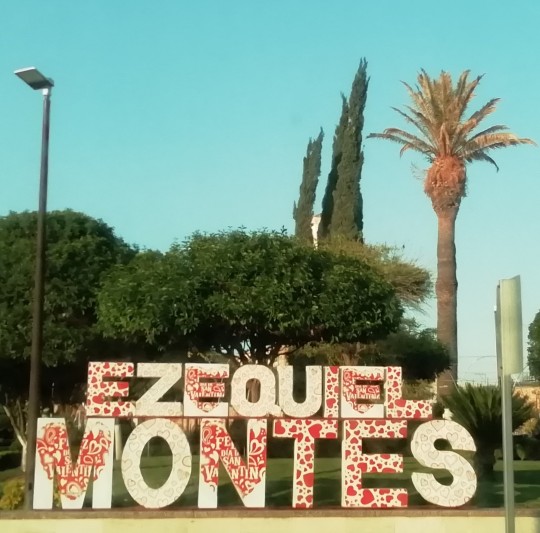
Visitamos unos talleres de ixtle en donde conocimos el trabajo que conlleva la obtención de este material y cómo realizan de diferentes colores y tamaños las variadas artesanías: estropajos, cepillos de exfoliación, cinturones, además de las reatas ocupadas cotidianamente en la charrería, cabe destacar que dicho proceso es sumamente complejo y tardado.
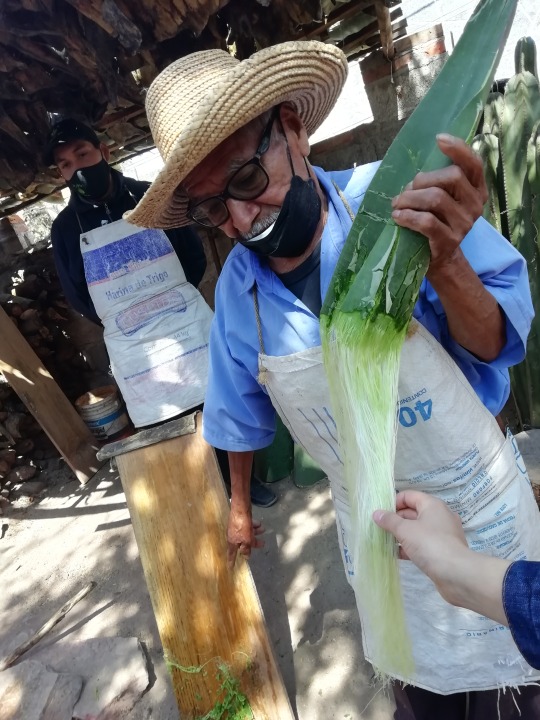
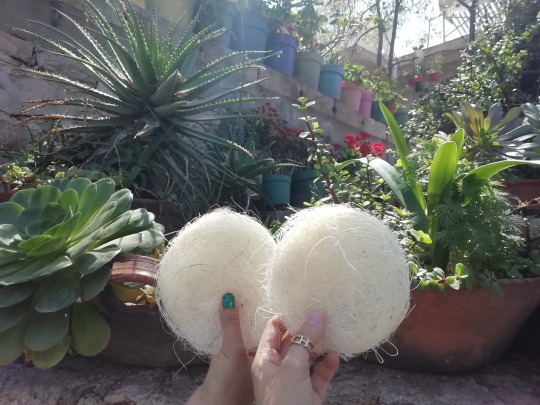
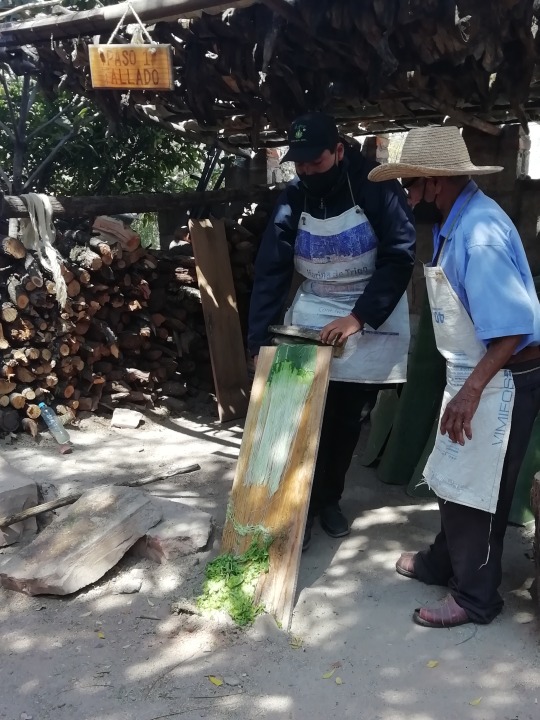
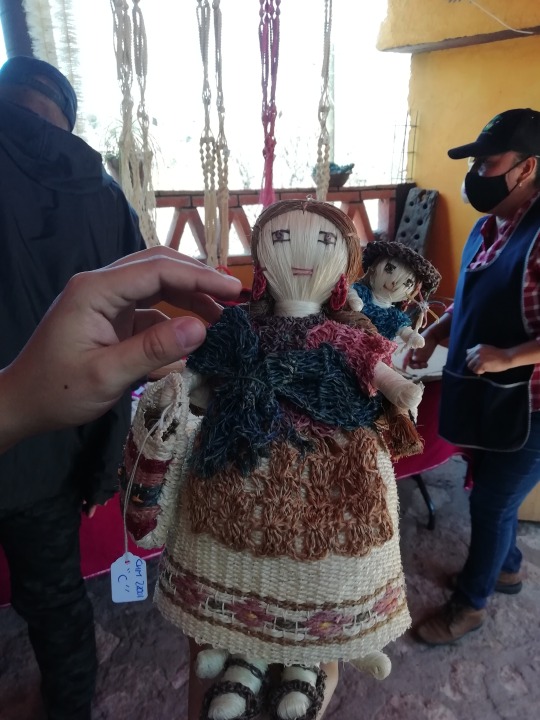
Posteriormente, paseamos de forma breve por las magníficas calles de Villa para así encaminarnos a la Bodega “Bothë” en donde elaboran una gran variedad de excelente vino artesanal y de ahí pasamos por fin a la añorada y más importante parte de nuestra aventura: comer en la cocina tradicional “Los Yugos”.
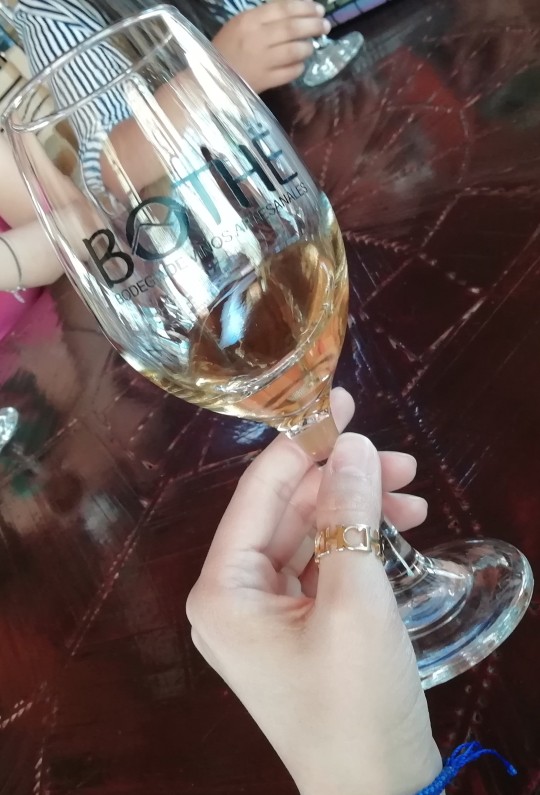
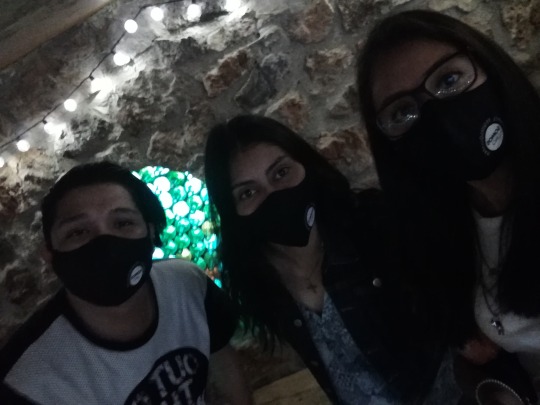
Este lugar tan pintoresco está decorado con objetos antiguos, además, una vibra rústica me hizo recordar los tiempos más entrañables de mi vida en los que solía comer en casa de mis abuelos (muy lejos de donde me encontraba en ese momento). Quizá ese sentimiento de familiaridad le dio ese último empujoncito que necesitaba la experiencia para volverla mágica.
Aquel día se presentó la oportunidad de experimentar un buffet basado en productos de temporada, dentro de los cuales tuvimos el placer de degustar nopales de santo, mole de xoconostle con carne de cerdo, tortitas de cilantro con queso, ensalada de nopales con chapulines, arroz, tortillas del comal, agua de sabor que compartía el mismo ingrediente principal que nuestro segundo plato (xoconostle) y un exquisito postre para nada convencional, del cual quedé fascinada: gelatina de garambullo con queso. ¡Uuh!, una maravilla de sabores y olores que te abrazan y apapachan el alma y por supuesto que también satisfacen nuestros gustos.
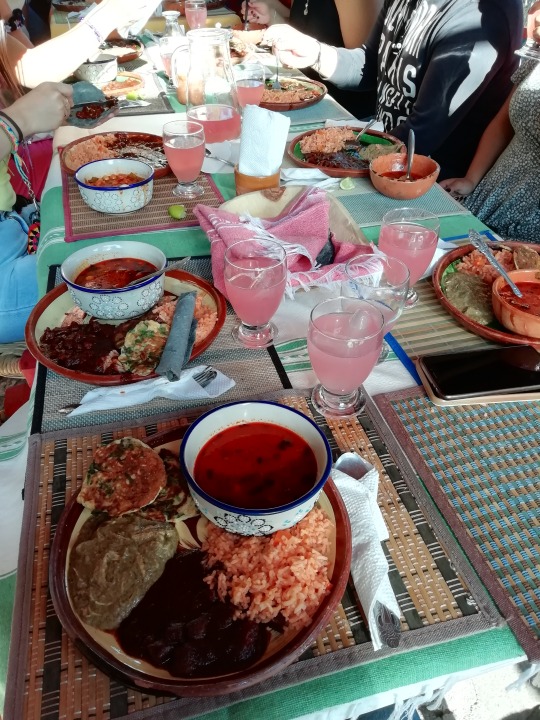
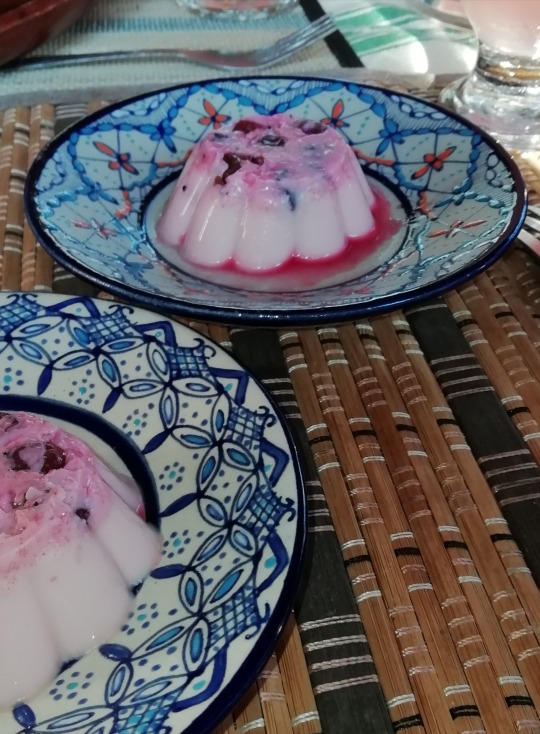
La chef, María de los Ángeles Esperanza Pérez, es la genio culinaria encargada de dicha comida tan especial y majestuosa, la misma que recibió una constancia por parte de la Universidad Autónoma “Benito Juárez” de Oaxaca, una Escuela de Gastronomía, por su participación en el evento “Zimatlán Gastronómico 2022”, lo cual incrementa el estatus y la jerarquía con la que cuenta tan delicada e inspiradora mujer.
Toda esta experiencia fue cerrada con broche de oro en aquel magnífico lugar, me hizo sentir que tanta espera encerrada valió toda la pena del mundo. Cierto, no fue el viaje más largo, ni visité el lugar más exótico del mundo, pero Villa Progreso y su gente tienen una facilidad para hacer sentir a uno en casa, aspecto que no cambio por nada. Para mí, todo ese recorrido es súper recomendado.
Fotografías de autoría propia.
2 notes
·
View notes
Note
❝ are you stalking me or something? ❞
Drawing up short, Severen attempts to hide the rope behind his back.
"I just was, uh", he can't think of a lie quick enough, his stupid plan too pervasive in his mind.
"Awh hell" he laughs pulling the lasso out and winding up, the reata swinging in wide loops.
"C'mon, lemme do it just once", he sounds near manic with joy, the idea of roping a giant creature, riding it slick, being bucked into oblivion too chaotic a machination to be passed up.
Lira would understand-- well, no she wouldn't, and she would be pissed if he did manage to live through this-- but there was no stopping the trainwreck now.
"Hard and fast, then I'll haul off, swear".
Ready to laugh all the way to his grave.
7 notes
·
View notes
Text
NOUTROS LUGARES
Não é que ser possível ser feliz acabe,
quando se aprende a sê-lo com bem pouco.
Ou que não mais saibamos repetir o gesto
que mais prazer nos dá, ou que daria
a outrem um prazer irresistível. Não:
o tempo nos afina e nos apura:
faríamos o gesto com infinda ciência.
Não é que passem as pessoas, quando
o nosso pouco é feito da passagem delas.
Nem é também que ao jovem seja dado
o que a mais velhos se recusa. Não.
É que os lugares acabam. Ou ainda antes
de serem destruídos, as pessoas somem,
e não mais voltam onde parecia
que elas ou outras voltariam sempre
por toda a eternidade. Mas não voltam,
desviadas por razões ou por razão nenhuma.
É que as maneiras, modos, circunstâncias
mudam. Desertas ficam praias que brilhavam
não de água ou sol mas de solta juventude.
As ruas rasgam casas onde leitos
já frios e lavados não rangiam mais.
E portas encostadas só se abrem sobre
a treva que nenhuma sombra aquece.
O modo como tínhamos ou víamos,
em que com tempo o gesto sempre o mesmo
faríamos com ciência refinada e sábia
(o mesmo gesto que seria útil,
se o modo e a circunstância persistissem),
tornou-se sem sentido e sem lugar.
Os outros passam, tocam-se, separam-se,
exatamente como dantes. Mas
aonde e como? Aonde e como? Quando?
Em que praias, que ruas, casas, e quais leitos,
a que horas do dia ou da noite, não sei.
Apenas sei que as circunstâncias mudam
e que os lugares acabam. E que a gente
não volta ou não repete, e sem razão, o que
só por acaso era a razão dos outros.
e do que vi ou tive uma saudade sinto,
feita de raiva e do vazio gélido,
não é saudade, não. Mas muito apenas
o horror de não saber como se sabe agora
o mesmo que aprendi. E a solidão
de tudo ser igual doutra maneira.
E o medo de que a vida seja isto:
um hábito quebrado que se não reata,
senão noutros lugares que não conheço.
Jorge de Sena (1967)
2 notes
·
View notes
Text
power-mad. dictator. his thoughts and energies and emotions are bounded by the farthest fence on the remotest inch of reata ranch. he’s not unkind to people. around, i mean. but to him they’re only important in relation to the ranch, his life, texas. he’ll never change.
the world will…your children will take another big step. enormous step, probably. some call it revolution but it’s evolution, really.
#ted reads giant#THIS IS WHAT IVE BEEN SAYINGGFGGG#THE INTERGENERATIONAL DYNAMICS ARE LITERALLY THE MOST IMPORTANT PART#after one hundred years the benedict family is finally a real big success
1 note
·
View note
Text
bulgarian and german forenames
Achar Adied Adisl Adisla Adrath Albea Alber Alenka Alislang Alladko Almutz Alvena Amaran Andema Andra Andreta Anermanko Angren Aniandrede Aninhalin Anivko Ankolavor Annedreas Arenz Arezhdanna Asparl Aspassabia Aspaurka Astomir Augun Baselch Baste Belch Beliia Berwina Betlin Biana Blate Blavrida Bogertina Bogober Bogottobia Bojida Bomania Bomarste Bomeorey Bomir Bonas Bonick Borald Borie Bornolava Boyanne Boyanuevin Bozda Bozdagomch Bozhald Bratjach Briam Carezhda Carid Carius Cheil Claus Clavko Colado Coritz Dagdav Daras Daril Desigma Desinz Destin Destrile Dielfrinel Dietlan Dimira Dimona Distin Ditur Dobete Durke Edredmuter Eksav Elenislav Elieta Elinian Elipp Elketho Elvinz Emalph Emich Emicolav Emirazko Emirka Emmelya Erolava Esenan Esissa Evina Ewaliessel Ewalina Ewalph Febar Fidar Floum Freiand Frianna Frifon Frigi Frila Frislavan Gargijan Gavetof Gelga Gelina Generin Geona Georg Georil Georiolena Gerobia Gerwila Gomcheine Gorstia Gothana Gottladred Grenelina Gricolai Griselia Grolad Grolav Grolfrede Grolias Grudiamen Grumir Guida Gus-pete Güntz Haeliedart Hanicto Hedenza Heida Heido Heilikatka Heina Heine Heinza Helgeordt Helger Heliy Heliza Helko Helvetera Herta Hertina Hilip Himir Hivin Hivko Homchanka Homir Hriana Hrisephil Huber Huntertina Ierilo Iliedried Iliiam Iliko Ilistina Iliza Ilyazm Ioriedy Iorina Iretliy Iritankas Iulra Iulriest Ivalizanan Ivalveter Ivanna Jernho Jivalk Joaco Johaelm Johaina Johar Johard Joharl Jorado Jorasimina Joscarl Josholarst Josla Joslatko Jossan Jossena Jostefka Josto Jostrid Juberazm Jubodola Jubomara Jürgana Jürgeria Jürgise Kalwietam Karkev Karoben Katefka Katjach Kattsca Khria Khrifon Khrin Khrist Kimiliia Kimircolf Kiricharka Klaynamuna Konimir Kosimon Kossann Krana Krudosla Kuried Laretto Lieslav Liian Lilber Liliy Lillena Liltel Lilyanalda Linra Liusta Ljubeta Ljutzimitz Loisla Lonka Lordanko Lotto Loueld Loumeon Ludmina Ludmutton Lukaria Lukehart Luker Lukert Luttfrist Lyana Lyubodna Lyubomard Lyubomeina Lütomariu Malin Malphilaus Manda Mannes Marain Mardan Maricob Mariebas Marist Marka Marmana Materozd Mictois Mihar Milhellin Miliza Mircoreta Mirke Mirmar Mirmardt Monalph Monimile Moriste Nadolausa Nadrago Nadrey Nathar Naylvin Nedar Nedentz Neveto Nimine Norin Ognika Ognyil Ognyilay Olphivka Ottel Ottla Ottomard Ottona Ottsanne Panislana Pastina Penold Petlis Peturt Phertan Phertin Radia Radimir Rahiva Ratyana Raugund Raynatyan Reata Reiana Reteliian Richeina Rimilav Rinalker Rithmale Rodna Rogda Rolfra Romira Romiran Roshanaina Rosselma Rostina Roter Rouelekko Rouelheina Roumeonka Roumiras Rumanne Rumeina Sabasterd Sabrin Samesena Samut Sanueva Savald Savana Savrika Sellaur Seselina Sesies Simich Snellaus Snellril Stara Starazko Stardia Staske Stefkarno Stelia Sterianne Sterma Stold Suliega Svena Svert Sveston Sveta Svetanalle Svete Svetelia Sveter Svetkona Svetlineza Sylon Tantch Termana Tihald Tinas Tinashorin Tinelmar Tinrazda Todna Todold Todolenia Todomir Tricoben Trida Tsven Tsvertinza Tsveterieb Tsveto Tsvetrian Tzven Tzvenz Tzver Tzvernese Tzveta Udmirase Uttan Utzislav Vasig Vastan Venja Vesebas Vestert Vestianka Vetria Viandt Vihaelya Vihars Vihomina Viold Viole Vyana Weria Werozda Wigmun Wigmuth Wilhel Wiliiankon Wilmart Winelevali Wolam Wolaus Wolaven Wolavolen Woleva Xelyazdank Yaskert Yorama Yoriana Yorka Yulana Yulchelya Yulietlav Yvetali Yvetolad Zhert Zhilmilese Zhilya Zhonicherg Zhonisla Zhoris Zladrado Zlauguna Zorda Zorezhil Zorgija Zorias
3 notes
·
View notes
Text
twirls my hair does anyone wanna talk about the shift in cowboy culture when hide became more valuable than meat and how that informed what we think of as cowboys today (the main tools of the vaquero were a special lance with a forked tip to sever the hamstring of cattle from horseback and of course THEE reata handcrafted with pride from treated rawhide NOT rope, both were used to down an animal with minimal damage) and also the way that rodeo culture developed out of training and practice games vaqueros would engage in
5 notes
·
View notes